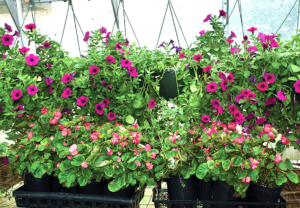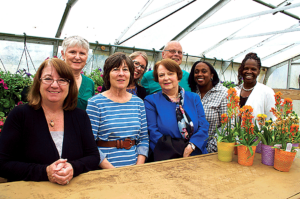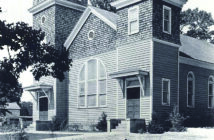Members of the Woodland Pond Garden Club and Chesterfield Juvenile Detention Center administrators braved the rain recently to reminisce and receive updates on the horticulture program and the Campbell-Cobb Greenhouse. The Chesterfield Life Changing Academy is part of the greenhouse program, and the garden club has been donating to them for 10 years.

HANGING BASKETS PREPARED TO BE SOLD BY THE ACADEMY.
The greenhouse program started in 2007, under the supervision of the detention center’s then-principal, Brad Peebles. The students in the post-dispositional program, a program Peebles hired Renita Davis-Kelley (Business and Information Technology teacher at the detention center) to run, are responsible for the planting and selling the plants, and the program is only for those who have been sentenced to the detention home for a minimum of six months. The program only has 16 students a year (eight each for six months), and they have both girls and boys.
After Pat Merson, former

Marianne Feeney, Betty Waltman, Molly Burkhardt, Marilyn Brown, Pat Merson, Brad Peebles, Shailana McFarland and Renita Davis-Kelley
president of the Woodland Pond Garden Club, saw an article about the the academy in a local newspaper, she invited Peebles and the students from the post-dispositional program to give a talk, and they have been donating ever since. With the money from the sales and garden club, the greenhouse has added another eight feet to the house, storage sheds, walkways, and garden plots.
According to Davis-Kelley, the garden club’s yearly donation also helps with supporting the cost of students attending the Young Chef’s Academy. For five weeks, students learn food preparation, etiquette, table setting, menu planning, and kitchen safety, and they can use ingredients from the garden. The Life Changing Academy is supported by the yearly plant sale. Merson lauded the students for their marketable skills and social skills.
“I noticed their social skills when they were taking my plants to my car, you know, they couldn’t be more helpful [and]they were very polite,” Merson said. “I was impressed because I’m a former teacher.”
Peebles said the detention home program is one of the few in the state that has had a greenhouse program the entire time and it is the longest-lived program in Virginia. He likened the planting of seeds to the growth of the students over time and the lessons they learn at the detention center.
“We’ve gone through several iterations of how youth plant seeds, and they’ve done different things, but those seeds become a vision to the future. That’s what it is when you plant a seed, you don’t plant it and say ‘Done;’ you plant it and you wait, and you see what comes up,” Peebles said. “And that’s an important concept for all of us, I think, and the youth get that here because they start with little tiny things and they grow big beautiful things, and then they get the business experience of maintaining records and selling them, and the money from it goes back into the house, and … still supports some of the activities, like [the]post-D program.”
Shailana McFarland, who has been a case manager at the detention center for a year, said the students get the most gains from the greenhouse program as they experience the stress of working hard, and that the skills they learn from dealing with customers at the plant sales help them when they graduate.
“Some of my most successful students at the plant sales have been the most successful ones when they leave. They’re able to get a job, they’re able to interview, they know you’re going to work hard, and as we become strong and [know]what we’re doing, we can better help the kids,” McFarland said. “because I am seeing a slow turnaround, less of them coming back into detention, which is ultimately our goal. Particularly for those who turn 18 because we definitely don’t want you to graduate to another level of detention confinement, so I’m very happy with it.”
Davis-Kelley discussed the different certifications students can get at the detention center, certifications that help them to be more marketable to employers.
“Our students … have the opportunity to earn industry certifications, they earn the Food Handler ServSafe certification, OSHA, the Career Readiness certificate, which has three levels – you can start at a bronze, silver, or gold level – and these certifications are placed on their resumes so it makes them a little bit more marketable,” Davis-Kelley said. “When they go to apply for a job, they can show something tangible to an employer that saying ‘not only am I in high school, that I have some certifications to show you that I’m the one for the job.’”
In addition to the greenhouse program and the chef’s academy, the students have reverse field trips – the woodwind quartet from Richmond Symphony performed and the Virginia Repertory Theatre has put on two productions this year – and they were the first detention center to get permission to take students across state lines when they went to Washington and met with Congressman David Brat. They also have partnerships with libraries, one of which reserved a certain number of spots for the students to participate in the Leadership Institute for the second year.
At the end of their meeting, the attendees exchanged congratulations and expressed gratitude for the continued success of the greenhouse program and opportunities given to the students via donations.
Betty Waltman, president of the garden club, said the club is proud of its long history of donating to the greenhouse program and proud that they are able to help.
“The Woodland Pond Garden Club is very proud that this is the 10th year that we have financially supported this horticulture and greenhouse program, and we’re very happy that we can play just a small part in helping our youth and helping our community,” Waltman said. “We’re looking forward to many future years of this close association with our club and the staff and these kids.”

